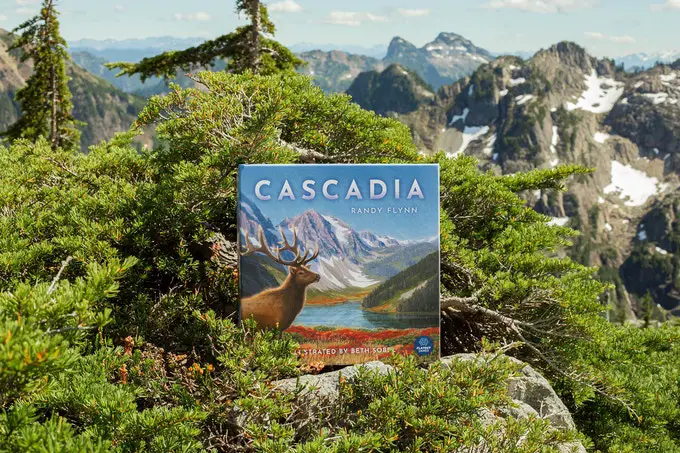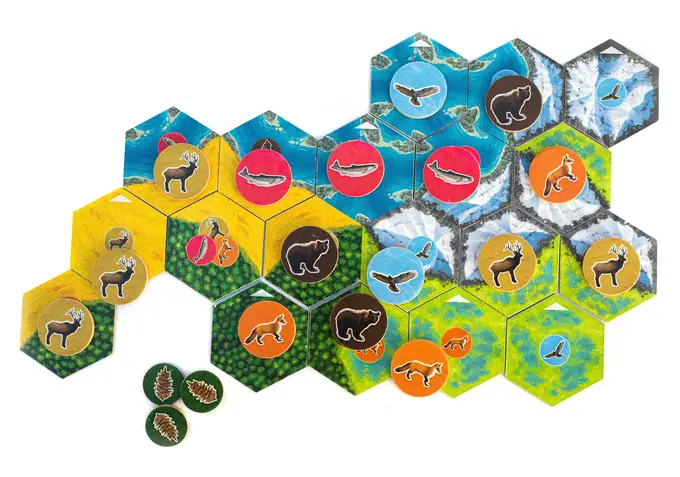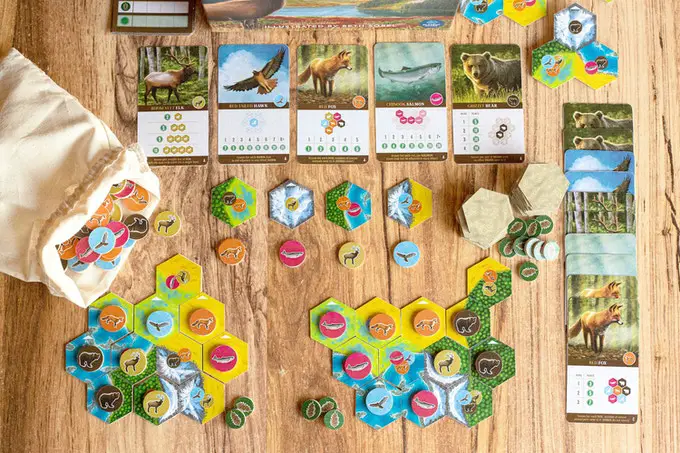Last time we talked with the folks at Flatout Games, they were working on a game all about donuts. Now, the design collective has a new game on Kickstarter, Cascadia, a tile placement game straight out of the wilds of the Northwest, and they were nice enough to give us the scoop on the creation process behind the new game.

The Fandomentals: What was the inspiration for Cascadia?
Flatout Games: Randy Flynn, the designer, was initially inspired by Calico (Kevin Russ) and Tiny Towns (Peter McPherson). He liked the “puzzly” nature of placing hex tiles in adjacencies to solve for different scoring conditions ( like in Calico), but also the idea of having variable scoring cards that could add a lot of replayability to the game ( like in Tiny Towns). The game was always about habitats and wildlife – it was originally called ‘Lands and Creatures’, but it didn’t have a specific geographic theme. As the team came together to develop the game, we thought it would be great to base it in Cascadia (EN: A geographical area comprising Oregon, Washington, and British Columbia)– where most of the team lives.
FM: What’s the “goal” you have for the game, or what do you want people to get out of
the game?
FG: Our goal is to create accessible, yet challenging, games for a wide range of gamers. We hope that people have fun and enjoy the crunchy decision-making of the dual-layer puzzle. We want all of our games to be games that gamers can share with their friends and family – whether they be gamers or not.
FM: Did Cascadia present any unique challenges compared to previous games you’ve worked on?

FG: I think the challenge is always to balance accessibility (easy to teach, easy to learn, friendly theme) with replayability and new challenges. With Cascadia, one of the fun challenges has been to think through different scoring conditions for each animal and how to make them feel intuitive and thematic. We did a lot of work on the overall gameplay flow of the game – there were a lot of little tweaks done that helped evolve it. One thing that we always knew we wanted to be true was that you couldn’t “solve” the puzzle too easily – so it needed enough variables, interesting drafting, freeform enough play (no board), so that the decisions were always full of tension – you can’t always do exactly what you want to do.
FM: How did you work to integrate the wildlife and outdoors into the gameplay mechanics of the game?
FG: The biggest way we did that was to think about each of the wildlife species and think about which spatial arrangements might make most sense for them. At its heart, Cascadia is, of course, an abstract game, but we always believe that games are more interesting and easier to teach if the theme helps to reinforce the mechanics. It makes sense for bears to be in groups, it makes sense for salmon to be in ‘runs’, etc. We wanted those things to click, so we worked hard to land the right animals with the right conditions. We also wanted to use representative animals and habitats so that the world felt ‘real’.
FM: Can you explain how the “puzzly” element was decided on and how does it differ from other tile placement games?
FG: Each animal has four options for scoring conditions and each game players will play with one of each type of animal. It allows for different combinations of scoring puzzles. The other thing that is a little different about Cascadia’s puzzle is that it is a double layer (one of habitats and one of animals). The draft is also a pool draft, which means you will be selecting more than one thing at a time. This means there will be more times when ‘I want this thing, but not that thing! What should I do?’. Even though the rules are super straightforward, every decision you make is advancing you towards one or more of your goals, and that sense of progression feels really good to us!
FM: How did you approach the solo and family modes of the game? What things needed to change to make them work?

FG: The solo mode is heavily influenced by the success of the Calico solo mode. We felt strongly that the game should be super easy to play solo. We didn’t want the upkeep of an AI player or anything like that. We know that some hardcore solo players really like that kind of thing, but we wanted to do what we could to bring solo gaming more into the mainstream by making the barrier to entry as low as possible.
With the family mode, we thought about all of the variables in the game and which ones were less dependent on other ones, so that we could ask ourselves if simplifying or eliminating them was possible. It was an exercise in reduction to see if the main gameplay loop could remain intact while reducing some complexity. We think for both Calico and Cascadia we have turned games that are already pretty easy for kids into experiences that even 4 or 5 year olds can enjoy with the rest of their family. That seemed like a pretty cool aspect for us, and our backers so far are really fond of the inclusion!
FM: Is there a favorite animal you included in the game?
FG: We love all the animals. We are actually sad that we couldn’t include all our favourite animals in Cascadia, like sea wolves, marmots, pikas, and orcas! …maybe if the game does well enough we can ‘expand’ upon the roster of animals…
You can still back Cascadia on Kickstarter, where the base game and all stretch goals (they’ve hit almost all of them) will run you $29.
Images via Flatout Games

